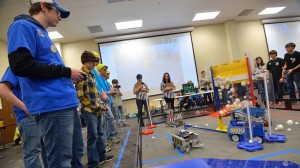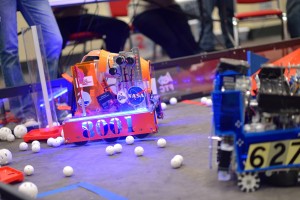
Area high school students contend in the FIRST Tech Challenge robotics competition sponsored by the Center for Mathematics & Science Education at the Jackson Avenue Center. Photo by Nathan Latil/Ole Miss Communications
OXFORD, Miss. – Mississippi middle and high school students will get to show off and compete with autonomous and driver-controlled robots they constructed in the state’s fourth robotics tournament at the University of Mississippi.
The UM Center for Mathematics and Science Education will host Mississippi’s FIRST Tech Challenge Robotics Tournament on Saturday (Feb. 27) at the Jackson Avenue Center. Opening ceremonies begin at 10:30 a.m., and all FIRST events are free and open to the public.
Four qualifying tournaments held throughout the state determined the advancements of the 22 qualifying teams that will compete in Mississippi’s FIRST Tech Challenge, or FTC. From there, the top four teams move on to compete in the South Super Regional in San Antonio to determine who goes to the world championship in St. Louis.
The Center for Mathematics and Science Education, or CMSE, is a division of the UM School of Education that sponsors the state’s robotics tournaments. These competitions are facilitated by the nonprofit organization FIRST, or For Inspiration and Recognition of Science and Technology, founded 20 years ago by renowned inventor Dean Kamen.
Students learn through hands-on activities to apply science, technology, engineering and math in competitions with an entertainment dynamic like that of a sporting event, said Mannie Love, CMSE program manager.
“FTC is aimed at students grades seven through 12 to inspire them to enjoy science, technology, engineering and math,” Lowe said. “We’re basically trying to say, ‘Let’s borrow from what works for sports and entertainment,’ and show young people that being smart and competing as a team in something like a robotics tournament is just as exciting as a being on a basketball or football team.”
Lowe, who has worked for the CMSE program since 2012, goes around the state to recruit new teams to the FIRST program while also helping to instruct schools’ faculty liaisons. When Lowe came to Mississippi in 2012, only four robotics teams existed. This year, 37 teams competed in the qualifying stages and 22 made it to the state FTC competition, he said.
FTC teams are adult-driven, usually by a school instructor, and student-led. The students get a reusable robotics kit and design, construct and program their robot to compete in challenges. Teams can be school-based, home-school-based, part of an after-school program or part of a community-based organization.
Lafayette County High School science teacher Taylor Langford was approached by a group of students to mentor the school’s team in the state’s first official FTC event. In his school’s fourth year of competing, Langford still considers it a learning process.
“I was glad they asked me to help,” Langford said. “At the time when we fielded our first team, it was just as much as learning experience for me as it was for the students.
“This year our group is a bit different because most of our original group has graduated, but we hope to be competitive, enjoy ourselves and learn as much as we can.”

The UM Center for Mathematics and Science Education will host Mississippi’s FIRST Tech Challenge Robotics Tournament on Saturday (Feb. 27) at the Jackson Avenue Center.
This year’s game is called FIRST RES-Q, played on a 12-by-12-foot square field with a surrounding foot-high wall, a soft foam mat floor and mountain or floor goals. The match pits pairs of robots against one another, starting with a 30-second autonomous period, where robots are operated via pre-programmed instructions, followed by a two-minute driver-controlled period.
Robots are scored on a pre-determined list of criteria. During the driver-controlled period, the team’s objective is to retrieve up to five “debris” pieces from the playing field and place them in the mountain goals or floor goals.
In the end game, robots can earn bonus points by scaling the mountain goals on the field to the topmost vertical section, extending more than three feet high at a serious incline.
Langford praises the camaraderie and competitiveness these tournaments invoke, but he has seen firsthand the opportunities and values students gain by participating in FTC.
“It is readily apparent as they went through the process of competing in robotics tournaments, students grew more confident in creative thinking, in their ability to execute a plan and in their overall robotics construction and programming,” Langford said. “Students have not only grown confident in their abilities, but also grown more confident in leadership roles and working together as a team.”
This is the overall goal of the FIRST experience, Lowe said. Although competitive in nature, the tournaments reward students for working together to solve problems outside the classroom in a fun, inventive way.
“We let the students learn,” Lowe said. “It’s all about student empowerment. We want them to get their own healthy educational experience.”
Follow Mississippi FTC on Facebook (MississippiFTC) and Twitter (@ms_ftc). For more information about the FIRST Tech Challenge or how to sign up for next year’s competition, go to http://ftc.umcmse.com/ or http://www.firstinspires.org/robotics/ftc, or contact Mannie Lowe at mlowe@olemiss.edu.